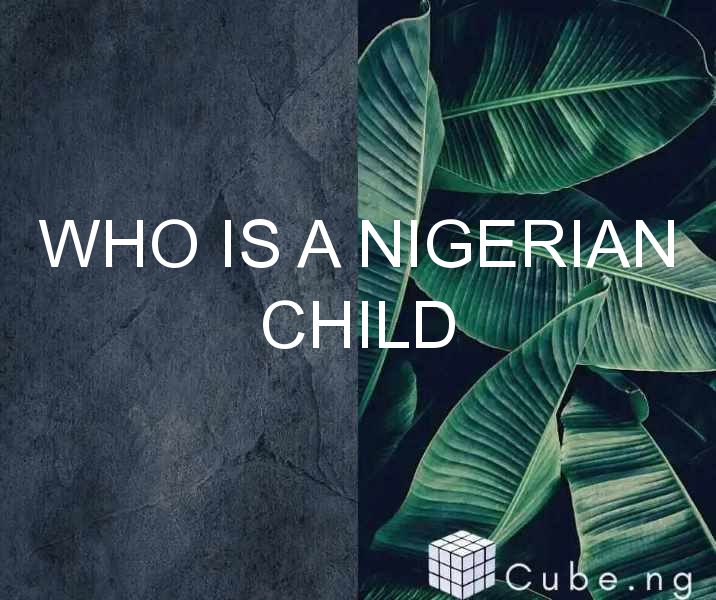Table of Contents
Who Is A Nigerian Child
Nigeria is a country in West Africa with a population of over 200 million people. The country is known for its rich culture, diverse ethnicity, and is home to over 250 ethnic groups, each with distinct languages and customs. With such a diverse country, it is important to understand who a Nigerian child is, and the many factors that shape their identity.
The Birth of a Nigerian Child
The birth of a Nigerian child is a momentous occasion, celebrated with joy and excitement. In Nigeria, the birth of a child is considered a blessing and a sign of prosperity. As such, parents and family members often go to great lengths to ensure the child is given the best care and upbringing possible.
Family and Community
Family and community play a significant role in shaping the identity of a Nigerian child. In Nigeria, family is considered the most important aspect of life, and it is not uncommon for extended family members to live together. The community also plays a crucial role in the upbringing of Nigerian children. In many Nigerian communities, it is said that it takes a village to raise a child. This means that the community is responsible for ensuring the welfare and development of the child.
Language and Culture
Language and culture are two significant factors that shape the identity of a Nigerian child. With over 250 ethnic groups in Nigeria, the country is home to a wide range of languages and cultures. The language and culture of a child's ethnic group often play a significant role in shaping their identity. For example, a child from the Yoruba ethnic group may identify strongly with their language and culture, and this may influence their worldview.
Education
Education plays a vital role in the development of Nigerian children. Education is seen as a means to upward social mobility, and parents often go to great lengths to ensure their children receive a good education. Education in Nigeria is divided into primary, secondary, and tertiary levels. The primary level of education is compulsory, and it is the responsibility of the government to provide free education at this level.
Religion
Religion is also an essential factor that shapes the identity of Nigerian children. Nigeria is home to many religions, including Christianity, Islam, and traditional African religions. The religion of a child's family often plays a significant role in their upbringing and worldview.
Gender Roles
Gender roles also play a significant role in the identity of Nigerian children. In Nigeria, there are often strict gender roles that dictate what is expected of men and women. For example, men are expected to be the breadwinners of the family, while women are expected to take care of the home and children. These gender roles can influence the aspirations and expectations of Nigerian children.
Socio-Economic Status
Socio-economic status is another factor that shapes the identity of Nigerian children. Nigeria is a country with significant wealth disparities, and a child's socio-economic status can significantly impact their upbringing and opportunities. Children from wealthy families may have access to better education and healthcare, while children from poorer families may struggle to access these basic necessities.
Politics and Governance
Politics and governance also play a role in shaping the identity of Nigerian children. Nigeria is a country with a complex political history, and the decisions made by the government can significantly impact the lives of Nigerian children. Children may be influenced by the political beliefs and values of their families and communities.
Entertainment and Media
Entertainment and media are also factors that shape the identity of Nigerian children. Nigeria is home to a thriving entertainment industry, with Nollywood being the second-largest film industry in the world. The media also plays a significant role in shaping the opinions and beliefs of Nigerian children.
Immigration and Diaspora
Immigration and diaspora also play a role in shaping the identity of Nigerian children. Many Nigerians live outside of Nigeria, and their experiences can significantly impact the identity of their children. Nigerian children living outside of Nigeria may identify more strongly with their Nigerian heritage and culture, while also being influenced by the culture of their host country.
Challenges Facing Nigerian Children
Nigerian children face many challenges that can impact their identity and development. These challenges include poverty, inadequate healthcare, poor education, and child labor. Children in Nigeria are also vulnerable to violence and abuse, including child marriage and human trafficking.
Celebrating Nigerian Children
Despite the challenges facing Nigerian children, they are resilient and full of potential. Nigerian children are known for their creativity, intelligence, and resourcefulness. As a country, it is important to celebrate Nigerian children and provide them with the resources they need to thrive.
Final Thoughts
In conclusion, Nigerian children come from diverse backgrounds, and their identity is shaped by many factors, including family, community, language, culture, education, religion, gender roles, socio-economic status, politics, entertainment, and immigration. While Nigerian children face many challenges, they are also full of potential, and it is important to celebrate and support them in their development. As a country, Nigeria must prioritize the well-being of its children to ensure a brighter future for all.




